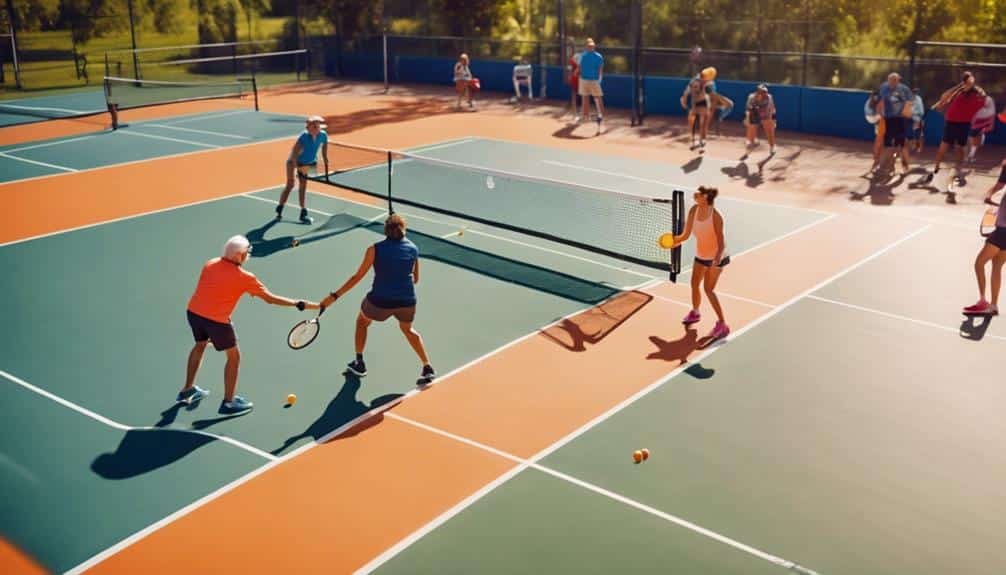As a pickleball player, I've found that reframing my mental approach has revolutionized my game. By shifting my focus from winning to personal growth, I've enhanced both my performance and enjoyment on the court. I've learned to identify and challenge limiting beliefs, set meaningful goals aligned with my values, and embrace challenges as opportunities. Developing a growth mindset has been crucial, allowing me to view mistakes as learning experiences. I've also cultivated positive self-talk and visualization techniques to boost my confidence. Balancing competition with enjoyment has led to more satisfaction and improvement. There's so much more to explore in the mental game of pickleball.
Key Takeaways
- Adopt a growth mindset to view challenges as opportunities for improvement and learning.
- Practice positive self-talk to boost confidence and performance during matches.
- Set process-oriented goals that align with personal values rather than focusing solely on winning.
- Use visualization techniques to mentally rehearse successful shots and strategies.
- Cultivate mindfulness to stay present, manage emotions, and enhance focus during gameplay.
The Power of Mental Reframing
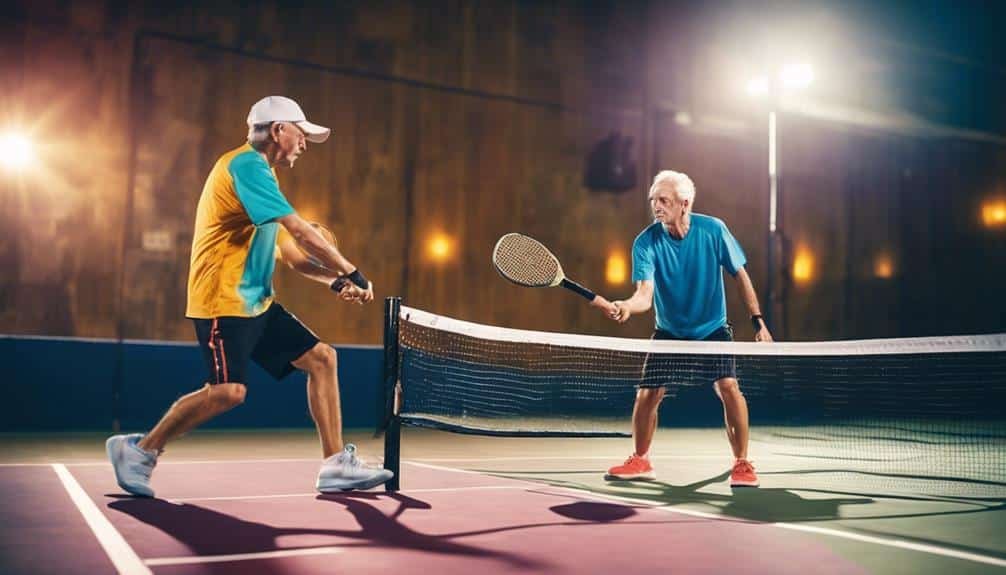
Reframing our mental approach to pickleball can dramatically enhance both our performance and enjoyment of the game.
As players, we often focus solely on winning, but this narrow perspective can limit our growth and satisfaction.
Instead, I've found that embracing mindset shifters can transform our experience on the court.
One powerful technique is to adjust our inner dialogue.
Rather than berating ourselves for mistakes, we can choose to view them as learning opportunities.
This shift allows us to stay positive and focused, even in challenging moments.
Another key reframe is to prioritize personal improvement over victory.
When we celebrate small wins and progress, we create a more fulfilling pickleball journey.
Identifying Limiting Beliefs
While reframing our mental approach is crucial, we must first recognize the limiting beliefs that hold us back on the pickleball court.
These beliefs often manifest as fearful thoughts or self-doubt, whispering that we're not good enough or that we'll never improve.
I've found that many players struggle with the idea that they're too old to learn new techniques or that they'll never be as skilled as their opponents.
These limiting beliefs can become self-fulfilling prophecies if we don't address them head-on.
To identify our limiting beliefs, we need to pay attention to our inner dialogue during games.
Are we constantly berating ourselves for mistakes?
Do we feel anxious before matches?
By acknowledging these thoughts, we can begin to challenge and replace them with more empowering beliefs.
Setting Meaningful Goals
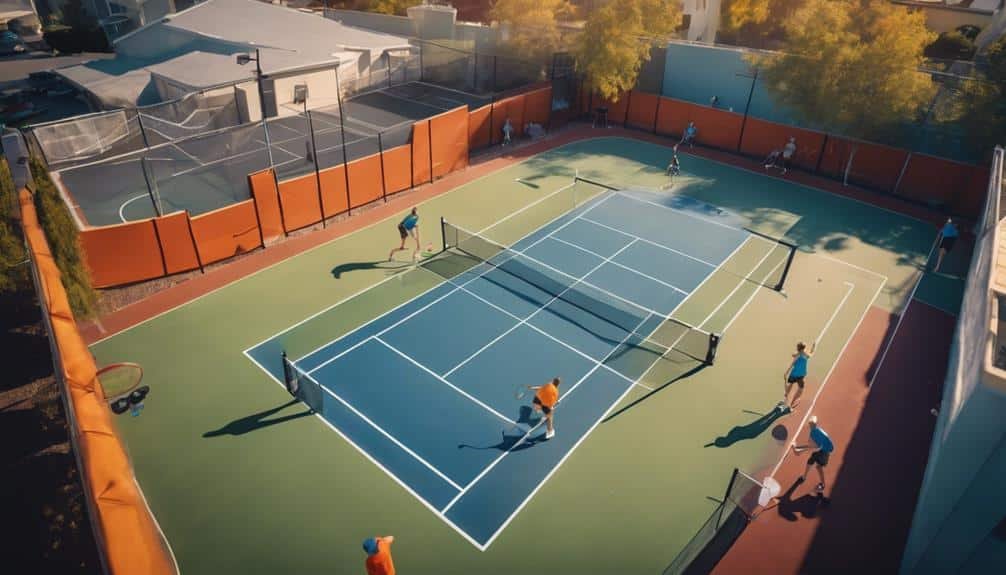
Ambition fuels progress in pickleball, but it's crucial to set goals that align with our personal journey and values.
As we strive to become game changers, we must focus on meaningful objectives that inspire our achievement motivation.
I've found that setting purposeful goals can transform our pickleball experience and overall growth.
- Align goals with your personal values and reasons for playing
- Focus on process-oriented objectives rather than just outcomes
- Set both short-term and long-term goals to maintain motivation
- Regularly reassess and adjust goals as you progress
Embracing Challenges on the Court
With our goals set, we're bound to face obstacles on the pickleball court that test our resolve and push us beyond our comfort zones.
Court anxiety can creep in, especially when we're playing with new partners or against formidable opponents.
It's crucial to remember that these challenges are opportunities for growth.
By reframing our perspective, we can view each match as a chance to learn and improve, rather than a test of our worth.
Friendship dynamics on the court can also present unique challenges.
We might find ourselves competing against close friends or struggling to maintain positive relationships during intense games.
It's essential to cultivate a mindset that values sportsmanship and mutual respect above all else.
Developing a Growth Mindset
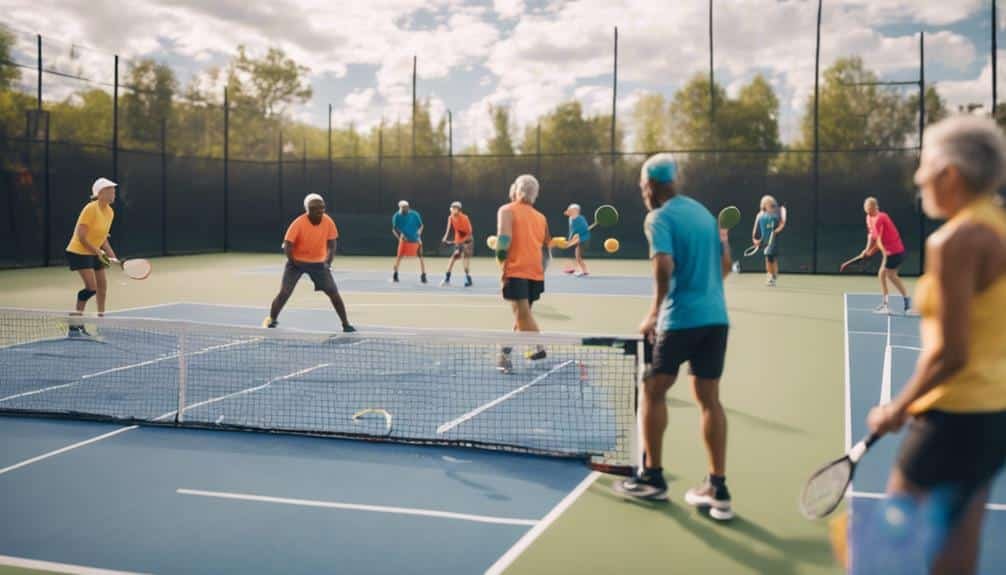
A growth mindset forms the foundation of continuous improvement in pickleball, allowing players to embrace challenges and learn from every experience on the court.
I've found that developing this mindset is crucial for our progress as players. Through mindful practice and fearless experimentation, we can unlock our true potential.
To cultivate a growth mindset in pickleball, I recommend:
- Viewing mistakes as learning opportunities
- Setting process-oriented goals rather than outcome-based ones
- Seeking feedback from more experienced players
- Celebrating small improvements and milestones
Practicing Mindfulness During Matches
Mindfulness during pickleball matches can dramatically improve our focus, decision-making, and overall performance on the court.
As players, we often get caught up in the heat of competition, losing sight of the present moment.
By practicing mindful breathing between points, we can reset our mental state and stay grounded.
This simple technique helps us tune out distractions and concentrate on the task at hand.
Being fully present allows us to react more effectively to our opponents' shots and make better strategic choices.
We'll notice subtle cues in their body language and positioning that we might otherwise miss.
Moreover, mindfulness helps us manage emotions like frustration or anxiety that can derail our game.
By staying aware of our thoughts and feelings without judgment, we can maintain composure under pressure.
Ultimately, cultivating mindfulness on the pickleball court enhances our connection to the sport and our fellow players.
Building Resilience in Pickleball
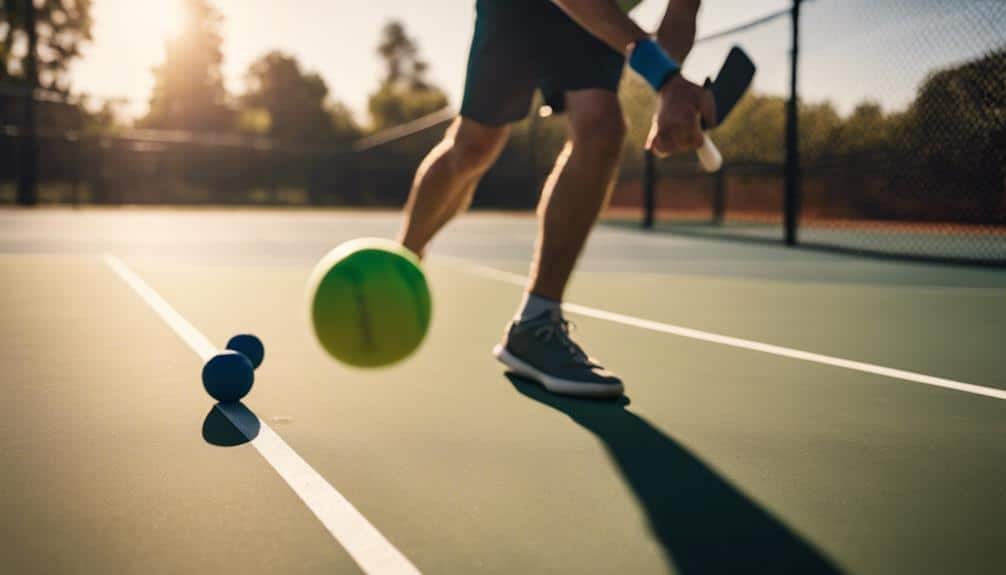
Throughout our pickleball journey, we'll face numerous challenges that test our mental fortitude and ability to bounce back from setbacks.
Building resilience is crucial for developing court confidence and achieving game harmony.
As a player, I've found that focusing on these key aspects can help strengthen our mental game:
- Embracing failure as a learning opportunity
- Practicing positive self-talk and visualization
- Setting realistic goals and celebrating small wins
- Developing a pre-game routine to center ourselves
Cultivating Positive Self-Talk
One of the most powerful tools in a pickleball player's mental arsenal is positive self-talk, which can significantly impact our performance and enjoyment of the game.
As part of our self-care strategies, we need to consciously replace negative thoughts with affirming ones. Instead of berating ourselves for missed shots, let's focus on the next opportunity. I've found that using phrases like 'I've got this' or 'Stay focused' can be effective confidence boosters during matches.
It's essential to practice positive self-talk off the court as well. By cultivating a habit of encouraging internal dialogue, we're better prepared to maintain composure under pressure.
Visualizing Success and Improvement
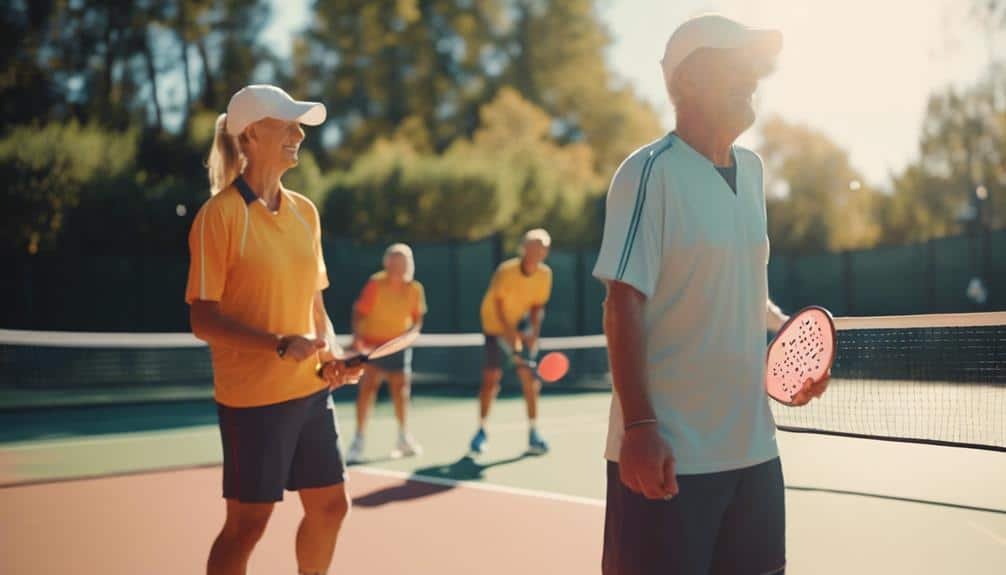
How can we harness the power of our imagination to elevate our pickleball game? By visualizing success and improvement, we're tapping into a powerful mental tool used by top athletes.
I've found that creating mental movies of my ideal performance helps me execute shots with more confidence on the court. Visual victory affirmations are another effective technique, reinforcing positive outcomes in our minds.
To incorporate visualization into your pickleball practice:
- Create a mental highlight reel of your best shots
- Imagine yourself calmly handling challenging situations
- Visualize perfect form for specific techniques you're working on
- Picture yourself celebrating victories with your teammates
Balancing Competition and Enjoyment
While visualization can enhance our performance, it's equally important to strike the right balance between our competitive drive and the sheer enjoyment of playing pickleball.
As players, we often get caught up in win patterns and game intensity, forgetting why we started playing in the first place.
It's crucial to remember that pickleball is more than just winning; it's about the joy of the sport, the camaraderie with fellow players, and personal growth.
To maintain this balance, I suggest periodically reassessing our relationship with pickleball.
Are we still having fun?
Are we pushing ourselves too hard?
By focusing on the process rather than just the outcome, we can find satisfaction in improvement and the social aspects of the game.
This approach allows us to compete at our best while still savoring the unique experience that pickleball offers.
Conclusion
I've seen firsthand how reframing your pickleball mindset can transform your game and life.
By shifting focus from winning to personal growth, we open doors to untapped potential.
Embracing challenges, cultivating positivity, and visualizing success aren't just court strategies; they're life skills.
Remember, every 'unforced error' is an opportunity for improvement.
As you step onto the court, carry this renewed perspective.
You'll find that pickleball becomes more than a game—it's a journey of self-discovery and joy.

